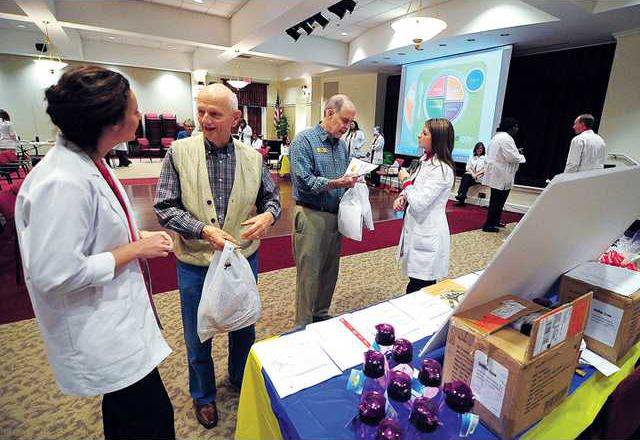Sometimes putting down the textbooks and stepping outside of the classroom can be just what the doctor ordered. Especially for students in fields like nursing, where hands-on experience can make or break a career. "One of the goals of our program is to educate and advance nurse practitioners, who will then go out in the rural setting where there is a real lack of access to care," said Carolynn DeSandre, assistant professor in the master of science program at North Georgia College & State University. "A big portion of our education is getting them to go out and do community outreach. It helps to build their education because they’re able to demonstrate what they know, and they’re also able to give back." North Georgia’s Master of Science in Nursing and Family Nurse Practitioner Program students recently hosted a wellness fair at Lanier Village Estates in Gainesville. The students, who were all registered nurses, gave the residents age-relevant information and tips concerning topics like diabetes, osteoporosis and memory loss. "There’s a lot of information out there about Alzheimer’s (disease) and dementia. People automatically think if I start losing my memory, that’s what I have. That’s not necessarily true," said Alisa Allicock, a North Georgia student. "To a certain degree, some memory loss is normal." Despite some loss to be expected, there are some signs to be on the lookout for when it comes to your memory. "It’s normal to sometimes forget a person’s name. It’s not normal to forget ever knowing that person. That’s one glaring sign," Allicock said. "Another thing is having difficulty learning and remembering new information. To some degree, it’s going to be hard to learn new skills as you get older, but not being able to learn at all is a warning sign." There are some things you can do to keep your brain cells active and to delay memory loss. "Doing mind stimulating activities like crossword puzzles, Sudoku and playing cards helps," said Suzy Childers, a first-year nurse practitioner student. "Also, doing new routines helps to keep your mind going." According to Childers, eating a diet rich in fish, fresh fruit and vegetables, whole grains and unsaturated fats can also help to keep your mind sharp. The nursing students chose their own topics to present to the residents. For their booth on heart disease and strokes, a group of students decided to conduct a risk assessment for each of the attendees. They also discussed how each of the residents could reduce their individual risk factors for being affected by either condition. "A stroke is kind of like a heart attack in your brain. It’s the same principle," said Kelly Fendley, a North Georgia nursing student. "Keeping your blood pressure and cholesterol low, exercising and not smoking would help lower your risk for heart disease and a stroke." Although they were taking on the roles of "teacher" during the wellness fair, the future nurse practitioners say the experience wasn’t without learning opportunities for them, too. "This helps you to look at things through their eyes," said Coyette Telemaque, a North Georgia student. "They’re the ones taking the medication or dealing with these conditions, so they can give us a perspective about what it is like and the barriers (to care) they face. "We can learn a lot from interacting with the community, so it’s like they’re educating us, also."
Health fair benefits NGCSU nursing students and participants

